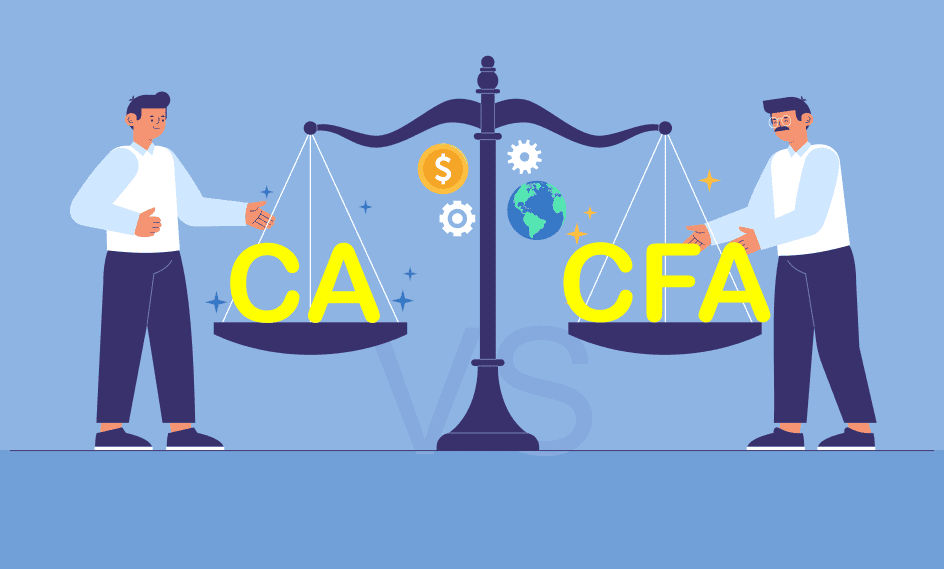Selection of professional financial courses may be rather difficult due to the availability of different certificates. These professional certificates contribute to developing a career and increasing professional competency. Among all the certifications in the world, the CFA and CA certifications continue to be the most recognized professional certifications today. As both of these certifications offer different advantages to the candidate and are beneficial for different domains within the finance and accounting field, choosing between the two should be a well-thought-out decision for a candidate.
This article will explain the difference between CA and CFA qualifications. You may be in a position to compare the two most sought-after professional certifications. We will discuss eligibility, curriculum, career opportunities, and international recognition. In this article, you will understand what each course is about and which will suit you according to your career aspirations and goals.
It is very helpful for those who are interested in investment management as well as for the accounting profession to make the right decision when selecting a designation that would be suitable for one. Lets do the CFA vs CA.
Introduction: CFA vs CA
In this constantly transforming field of finance, a highly recognized course can play a major role in enhancing career prospects and affirming one’s capability. Two global professional qualifications are more or less well-known and acknowledged: the Chartered Accountant (CA) and the Chartered Financial Analyst (CFA). These credentials are required in the financial industry as they address the needs of various organization. Both the courses develop varying skillset.
About CA Course
The Chartered Accountant is the premier professional accreditation in the accountancy business and originated on 1 July 1949. ICAI offers a CA qualification that gives first-hand accounting and financial management knowledge. These involve financial accounting, auditing, taxation, and business law. The involvement of Chartered Accountants is crucial to ensure that organizations comply with the legal requirements & financial stability and formulate an organization’s overall financial strategy.
About CFA course
The Chartered Financial Analyst (CFA) program, set up in 1963 by the CFA Institute, is recognized as the standard of education and training for the investment industry. The CFA program is all about investment management, financial statement analysis, and the codes of ethical conduct. The areas covered in this course are equity, fixed income, derivatives, and portfolio. The rigorous academic curriculum, the format of the course, and the examination system are all oriented towards the goal of developing professional investment personnel who will be in a position to make effective and ethical decisions involving investments.
Difference between CA and CFA course
To conduct CFA vs CA, we used several criteria. Based on those criteria, we did the comparison of the CFA and CA courses:
| Aspect | CA | CFA |
| Duration | This course spans 3-5 years, including an article ship period of 3 years. | The CFA course takes at least 2 years or more to be completed. |
| Eligibility | a) Students in Students in their 12th year can apply for the foundation course. b) Graduates can opt for the direct route and register for the intermediate course directly c) Commerce graduates need 55%, and Non-commerce graduates need at least 60% | a) Students need to be a graduate. b) You can take the Level 1 exam in your final year of graduating. c) Higher secondary students can also apply but need four years of relevant experience. d) Every applicant needs to have a Valid international passport. |
| Exam Details | CA has 3 level of exam – Foundation, Intermediate, and Final exams. | CFA has to Pass three level, CFA Level I, CFA Level II, and CFA Level III. Discharge professional work experience obligations. |
| Experience | Complete articleship/training of two years before final exam | Expierence of 4000 hours within 3 years before, during, or after joing the program |
| Syllabus | The subjects include accounting, taxation, Auditing, Financial management, Financial reporting, strategic management, corporate laws and economic law | The subjects include Ethical and Professional Standards, Quantitative Methods, Economics, Financial Reporting and Analysis, Corporate Finance, Equity Investments, Fixed Income, Derivatives, Alternative Investments, Portfolio Management and Wealth Planning |
| Duration | CA course duration can take upto 5 years and upto 4.5 years if taken direct entry route. | CFA can take on an average 3 years |
| Fees | INR 1,00,000 (approx.) | INR 3,00,000 to 4,00,000 (approx.) |
| Jobs | Internal Auditing, Taxation, Auditing, Accounting and Finance, Taxation Advisory, Statutory Audit, Bookkeeping, Finance Controller etc. | Portfolio manager, Research & Consultation, Risk Analysis and Risk Manager, Investment Strategy, Chief Investment Officer, Asset Management, Private Wealth Management, Commercial Banking, Investment Banking, Insurance etc. |
| Salary | Starting salary of CA will be 8 lakhs | Starting salary minimum 10 lakhs after you become CFA chartholder. |
Which is better, CA or CFA?
Looking at the difference between CA and CFA, it’s quite obvious both are equally important and play a key role in the finance industry. The CFA and the CA are extremely satisfying career choices that offer large earnings, room for advancement, and strong demand in the business world. Your passion and areas of interest will determine which option is best for you. CFA is the best option if you have a strong interest in finance. You can choose CA if taxes and accounts drive your interests.
In general, individuals seeking employment possibilities in India choose CA. However, those seeking global employment opportunities tend to choose CFA. Chances for CFA experts are increasing along with the growth of MNCs and startups in India. Thus, there is a great demand for CFA and CA in India. You have the freedom to choose the profession you wish to pursue.
CFA after CA
After earning a CA qualification, pursuing the CFA designation might improve your professional skills and career prospects. Here are a few main benefits
For the CAs, clearing the CFA level 1 exam is as easy as a pie.
Conclusively, CFA level 1 is extremely competitive to clear; however, those who have passed the CA levels do not find it very challenging. It is worth noting that a significant portion of the CA syllabus coincides with the content of Level 1 of the CFA examination, such as Financial management and strategic management. A little practice will be required before you sit for the examination.
Having two top accounting degrees can generate global value and increase career opportunities
The CA course orients the candidate for accounting in India, Australia, the Middle East, Ireland, and some parts of Europe. The CFA course teaches about finance analysis problems all over the world. You can take one highly significant position instead of two. When you finish these two courses, you have skills in accounting and finance, making you a professional with an edge over those with only one degree.
Higher Earning Potential
With the skills you possess after the CFA and CA, you are in command of asking for a higher salary, and companies will be obliged to pay you. You will have the opportunity to climb the corporate ladder quickly, which eventually increases your pay.
Conclusion
Students who wish to pursue careers in tax and auditing and who can devote their critical years to this field can consider studying for a CA degree. Aspirants interested in a career as investment bankers or financial analysts might pursue the CFA program. Any of these could be a potential career path for you. You can also study both courses if you’re still undecided. You will look like a tireless opponent during interviews with your eye-catching résumé and two respected qualifications. Not only that, but you’ll also need to anticipate higher pay.
If you liked the CFA vs CA, we recommend you check another financial course that we have curated for commerce graduates.




